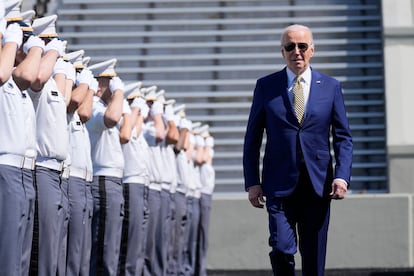How the Latino vote could punish Biden, Trump and the mainstream parties
A recent poll shows that the Democratic candidate maintains a slight advantage over the Republican. However, a third option, Robert F. Kennedy, is emerging as the main threat to the president’s re-election


Despite what’s been reported for months, Latinos are not joining the Republican ranks en masse. A recent survey shows that although President Joe Biden maintains his advantage, a good part of the Hispanic electorate is moving away from bipartisanship. According to the survey, 59% would vote for Biden, while 39% would vote for the Republican candidate, Donald Trump, in the event of a repeat of the 2016 showdown. However, these percentages fall to 47% and 34%, respectively, if a third candidate were to enter the fray: 17% of voters are in favor of an alternative to the two main parties.
“What we are seeing is that there is no significant shift to the right among Latino voters, instead, there are many who are frustrated with a two-party system and are seriously considering voting for a third party,” said Maria Teresa Kumar, the president of Voto Latino. This organization, which supports the Democratic Party, is behind the survey, which was carried out by the GQR polling company among 2,000 Latino voters in the states of Arizona, North Carolina, Nevada, Texas and Pennsylvania.
The biggest threat to Biden is the third-party candidate Robert F. Kennedy, who would obtain 12% of the votes; while Cornel West would get 3%; Green Party candidate Jill Stein would receive 2%, and 1% are undecided.
According to Kumar, the Democratic Party should focus on making it clear that Kennedy does not represent his family’s brand. “Now’s the moment for the campaigns to define Kennedy and demonstrate that he’s also an extremist, right along the lines of Donald Trump […] It is time to take him seriously and talk to individuals to recognize that a vote for him is a vote for Donald Trump,” she recently said.
Women and young people
Women and younger people are the most likely to vote for a third-party candidate. Voto Latino argues that this is because they are harder hit by the economy, which is the top issue for Latino voters. More than 35% of young Latinos say they have applied for government assistance in the last year, and 52% admitted to having had to postpone the purchase of a house or a car.
Ameer Patel, program director of Voto Latino, explains that, in general, the Hispanic voter believes that Biden does a better job on issues such as climate change, democracy and abortion. “However, when we talk about the economy, either it is even or Trump has a potential advantage,” he said.
Furthermore, in an election year in which there are four million new Latino voters, one of the challenges is convincing young people to go out and vote, given the high level of disaffection in this section of the community, which is more disengaged from politics. The survey reveals that only 37% of young voters express enthusiasm for the elections, with the rate higher among Republican voters than among Democrats.
Biden’s campaign has found it difficult to demonstrate the economic progress that has taken place over the past four years. Although the data has highlighted the resilience of the U.S. economy, inflation — which is still above target — is negatively affecting the Democratic candidate.
According to the survey, 52% of respondents listed inflation and the cost of living as the main factor determining their vote, while employment came in second place, with 28%. In total, four out of five respondents ranked the economy as their biggest concern. “It is impossible to overstate the impact of inflation and the economy on the Hispanic electorate. And it is much worse to suggest to these voters that their economic efforts reflect misinformation,” the survey warns.
Among the states that have been studied, Nevada emerges as the one that needs the most attention and offers the most possibilities of gaining the support of the Latino vote, while Pennsylvania appears to be the state in which the Democrats have the least room for growth.
In addition to the economy, two issues that will influence the vote are abortion, for 27% of those surveyed, and border security, which is one of the biggest concerns for 23% of Latinos. The CQR survey was conducted before Biden signed the decree that toughens conditions for accepting migrants and the right to request asylum. It remains to be seen what effects the closure of the border will have on the Latino community.
The Latino vote has become the most sought-after trophy in these elections. A force of more than 36 million voters will be decisive in tipping the balance towards one side or the other. In the 2020 elections, six out of 10 Latinos voted for Biden, a decisive factor in winning the White House, but the community’s support had already been declining since 2016.
Even so, and despite the fact that in recent months rivers of ink have flowed to show that this year a transfer of the Latino vote to the Republican Party is taking place, many experts have been skeptical that the change is significant.
What the majority has agreed on is that the Democratic Party has assumed that it has the Hispanic vote assured, when polls to date have shown the opposite. The survey, which reverses this statistical trend, was carried out between April 25 and May 7 and has a general margin of error of 2.19 percentage points: 77% of responses were obtained by text message, while the remaining 23% were done online, where the margin of error is greater.
‘Latino Americans for Trump’
For its part, Trump’s campaign team last week changed the slogan from “Latinos for Trump” to “Latino Americans for Trump,” in an attempt to gain the support of the community. This in turn collides with the anti-immigrant rhetoric that the Republican candidate has maintained during the campaign, in which Latinos have been the object of insults and whom he has compared to criminals and terrorists.
Racism, along with democracy, is precisely the main reason given by respondents who would not vote for Trump, followed by corporate tax cuts. Among young people, however, the reasons that would move them not to vote for the Republican candidate are the expected disappearance of the Obamacare health program and the pro-gun policy. Last month, Trump appeared at the National Rifle Association’s annual meeting and promised to defend gun rights, securing the endorsement of one of the groups whose support he won’t have to worry about.
Sign up for our weekly newsletter to get more English-language news coverage from EL PAÍS USA Edition
Tu suscripción se está usando en otro dispositivo
¿Quieres añadir otro usuario a tu suscripción?
Si continúas leyendo en este dispositivo, no se podrá leer en el otro.
FlechaTu suscripción se está usando en otro dispositivo y solo puedes acceder a EL PAÍS desde un dispositivo a la vez.
Si quieres compartir tu cuenta, cambia tu suscripción a la modalidad Premium, así podrás añadir otro usuario. Cada uno accederá con su propia cuenta de email, lo que os permitirá personalizar vuestra experiencia en EL PAÍS.
¿Tienes una suscripción de empresa? Accede aquí para contratar más cuentas.
En el caso de no saber quién está usando tu cuenta, te recomendamos cambiar tu contraseña aquí.
Si decides continuar compartiendo tu cuenta, este mensaje se mostrará en tu dispositivo y en el de la otra persona que está usando tu cuenta de forma indefinida, afectando a tu experiencia de lectura. Puedes consultar aquí los términos y condiciones de la suscripción digital.








































